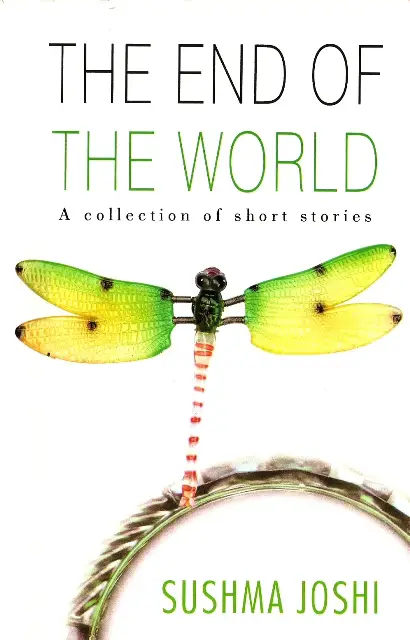 Sushma Joshi is a Nepali writer and filmmaker who was born in 1973 in Kathmandu. She has published The End of the World (2008), a collection of short stories, Art Matters (2008), a books of essays about contemporary art, and New Nepal, New Voices (co-editor, 2009), a selection of articles. In this interview she talks about her books, writing, Nepal and her future trip to Thailand.
Sushma Joshi is a Nepali writer and filmmaker who was born in 1973 in Kathmandu. She has published The End of the World (2008), a collection of short stories, Art Matters (2008), a books of essays about contemporary art, and New Nepal, New Voices (co-editor, 2009), a selection of articles. In this interview she talks about her books, writing, Nepal and her future trip to Thailand.
Mihnea Voicu Simandan: Your collection of short stories, The End of the World, has quite a few references to politics, especially the Maoist struggle for power. What is the relationship between fiction and politics?
Sushma Joshi: Politics can be an incomprehensible beast. How better to describe the complexities of the cotemporary moment than through fiction?
MVS: Your concern with injustice and the tough life of poor Nepalese is an obvious theme in The End of the World. Does literature have the role to raise awareness of social injustice?
SJ: No, I don’t think that’s necessarily the job or obligation of literature. I love this Leo Tolstoy quote and I subscribe by it: “The aim of an artist is not to solve a problem irrefutably, but to make people love life in all its countless, inexhaustible manifestations. If I were told that I could write a novel whereby I might irrefutably establish what seemed to me the correct point of view on all social problems, I would not even devote two hours to such a novel; but if I were to be told that what I should write would be read in twenty year’s time by those by who are now children and that they would laugh and cry over it, and love life, I would devote all my own life and all my energies to it.”
MVS: How was the book received? Is it still available in bookstores? I bough my copy at a secondhand bookstore in Bangkok.
SJ: I am one of a handful of authors writing and publishing in English in Nepal, so there was great deal of interest in the book. Unfortunately, the publishers did not give me royalty, and so we parted ways. It is currently out of print (if the bookstore sells you one, it’s a pirated copy). I am planning to publish it myself in case I don’t find another publisher outside Nepal.
 MVS: What is your writing routine?
MVS: What is your writing routine?
SJ: I write between jobs. I take a month or two off every year. I edit multiple times!
MVS: When will you publish another book of fiction?
SJ: My new novel is a love story set in Nepal’s civil conflict. I was working for the UN during the conflict—I realized the scope of the stories could only be captured by fiction. I’m trying to find publishers in the UK and Europe. Hopefully you will get to read it soon.
MVS: What advice would you give to aspiring writers?
SJ: Keep writing. Don’t give up hope. Take pleasure in the writing process. Keep fighting for your rights as writers.
MVS: Apart from being a writer, you are also a filmmaker, telling stories through a different medium? Is there a strong connection between ‘the writer’ and ‘the filmmaker’?
SJ: Film is a visual medium in which you tell stories without many words. It forces you to visualize. Being a filmmaker makes you a better writer, and vice versa.
MVS: You have been awarded the Asia Fellowship and will travel to Bangkok in October. Give us more details.
SJ: I will be researching the stories of Nepali migrants in Burma and Thailand. I am excited at this opportunity to learn more about my own people and the way they moved throughout Asia, and also excited at the chance to live and learn about two other Asian countries. I’ve lived in the USA and England, but not in any country in Asia.
MVS: From a literary point of view, where does Nepal stand today?
SJ: Nepal is at the crossroads between India and China. We have almost 30 million people. Nepal is full of mythologies, histories, stories. But publishing in Nepal is run by a small number of publishers who rarely pay writers, and booksellers who pirate books. Writers become dispirited and are not motivated to work in this environment. I think if there is less tolerance of copyright violations and piracy, more young people will produce exciting work in the coming decades.
MVS: Give us three reasons why a trip to Nepal would be rewarding.
SJ: Nepal has amazing artistic traditions, from painting to sculpture to architecture. Nepal has incredible geography—it amazes me even though I was born here. And most of all, it has amazing people. So come see for yourself!
MVS: Thank you for your time. I’m looking forward to reading your next book.
SJ: Thank you Mihnea!
Watch The Escape, a short film by Sushma Joshi.
Mihnea Voicu Simandan
Bangkok, Thailand
August 20, 2010


To: Sushma Joshi
What would you best estimate for population of the Gorkhali community in Myanmar? Are there any official stats?
Dear Dr Falk: The population estimates varied widely. People seemed to think it went from 100,000 to 500,000. There are Gorkhalis in many small villages and towns in Myitkyina. Also in Towngii, pwe Oo Lin, Mandalay, Yangon, and Mogok. I am sure there are other areas with heavy Gorkhali concentrations. They are also very active in trading in the border areas of India and China.
Dear
sushma,
how about the living standard of Nepalese in Burma, Thailand? Are they treated as 2nd citizen of that country?